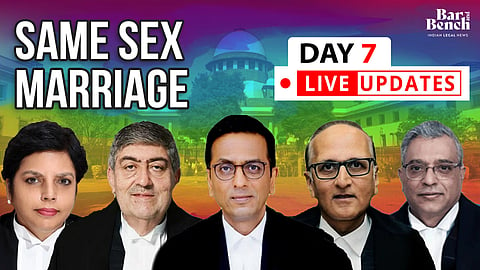- News
- Columns
- Interviews
- Law Firms
- Apprentice Lawyer
- Legal Jobs
- हिंदी
- ಕನ್ನಡ

A Constitution Bench of the Supreme Court is hearing a batch of pleas seeking legal recognition of same-sex marriages in India.
The bench is led by Chief Justice of India DY Chandrachud and also comprises Justices Sanjay Kishan Kaul, S Ravindra Bhat, PS Narasimha and Hima Kohli.
During the last hearing, the Central government argued that if unbridled personal autonomy is permitted in terms of sexual orientation, it could potentially be used to challenge provisions that prohibit incest.
The batch of petitions have sought the recognition of same-sex marriages under law, arguing that the right to marry a person of one’s choice should extend to LGBTQIA+ citizens as well.
The Central government has opposed the petitions.
In an affidavit filed before the top court, the Central government said that living together as partners and having sexual relationship by same sex individuals is not comparable to the Indian family unit concept which involves biological man and biological woman with children born out of such wedlock.
The Centre has also filed an application asking the Court to first decide on the maintainability of the petitions.
Similar views have been expressed by Islamic religious body Jamiat-Ulama-I-Hind, which has said that notions like same sex marriage originate from western culture that have radical atheistic worldviews and the same should not be imposed on India.
The National Commission for Protection of Child Rights (NCPCR) has opposed conferral of adoption rights on same-sex couples, relying on a study which shows that such a child gets affected both socially and psychologically.
However, the Delhi Commission for Protection of Child Rights (DCPCR) has supported the case of the petitioners, and said adoption and succession rights must be conferred on same-sex couples.
The Bar Council of India (BCI) recently held a joint meeting with all the State Bar Councils in the country and passed a resolution requesting the Court to leave the same-sex marriage issue for legislative consideration.
The BCI's statement was later condemned by the Supreme Court Bar Association (SCBA) stating that it is the duty of the apex court to hear the petition and decide whether it should be adjudicated by the Court or be left to the wisdom of the parliament.
Read more about Day 1 hearing here and here.
Read more about Day 2 hearing here and here.
Read more about Day 3 hearing here.
Read more about Day 4 hearing here.
Read more about Day 5 hearing here.
Read more about Day 6 hearing here and here.
Live updates from the hearing today below.